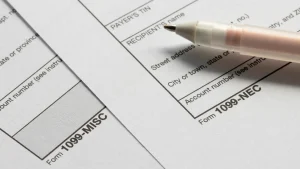The IRS uses a 1099 form to document income received by taxpayers from sources other than their employers. If you work as a freelancer, investor, or independent contractor, you should be familiar with the IRS 1099 form. This article will teach us more about the IRS 1099 form, including the various types and essential deadlines.
What is an IRS 1099 Form?
IRS Form 1099 is a tax form that lists different types of income people or businesses earn in addition to regular paychecks, salaries, or tips. The IRS records this information through these forms since these income sources don’t have taxes taken out upfront, ensuring individuals and businesses include it when they file their taxes.
The Purpose of a 1099 Form
The purpose of a 1099 form is to document income that does not come from a regular paycheck, such as payments to freelancers, investors, or anyone else pulling in taxable money from non-employee gigs.
Unlike the W-2, which tracks employees’ earnings through salaries or wages, the 1099 captures broader earnings. The IRS relies on these forms to keep tabs on money that does not automatically have taxes applied, making sure people report it properly when they file. It is a key way for the authorities to hold the line on tax rules and keep unreported income in check.
Who Receives a 1099 Form?
Individuals who receive a Form 1099 include a diverse group of earners. This list encompasses freelancers, independent contractors, consultants, gig workers, small business owners, and investors earning dividends, interest, or capital gains.
It includes retirees withdrawing funds from IRAs or other retirement accounts and any individual who receives $600 or more from a non-employer source.
Types of 1099 Forms & What They Cover

1. 1099-NEC (Nonemployee Compensation)
The 1099-NEC is issued to independent contractors, freelancers, and self-employed individuals. It was created to replace the 1099-MISC and clarify the distinction between it and other miscellaneous income.
2. 1099-MISC (Miscellaneous Income)
The 1099-MISC is used for income that does not fall under the other 1099 categories. This applies to income sources such as rental income, royalties, prizes, and awards totaling $600 or more.
3. 1099-INT (Interest Income)
1099-INT is a form that reports interest earned on savings accounts, CDs, and bonds. Banks, credit unions, and other financial institutions typically issue it.
4. 1099-DIV (Dividend Income)
The 1099-DIV form reports dividend income and capital gains from stocks and mutual funds. Investment firms and brokerage accounts issue it to taxpayers and the IRS.
5. 1099-B (Broker and Barter Exchange Transactions)
1099-B reports the sale of various securities, such as stocks, bonds, mutual funds, and other investment assets. The form provides a detailed summary of each transaction, including capital gains and losses, to help determine an individual’s tax liability on investment income.
6. 1099-R (Retirement Distributions)
Retirees who receive distributions from IRAs, pensions, or annuities must file a 1099-R form. This covers both taxable and non-taxable withdrawals.
7. 1099-G (Government Payments)
State tax agencies and unemployment offices issue 1099-G, or government payments. It is intended for income from unemployment compensation, state tax refunds, and government grants.
The 1099 Schedule: Key Deadlines
When to Expect a 1099 Form
The first crucial deadline is in early February. Businesses must issue forms to ensure that recipients receive them on time. This provides ample opportunity to prepare documents and report accurately before the next deadline in April.
When to Report 1099 Income on Your Tax Return
The deadline to report your 1099 income on your tax return is April 15 unless the IRS extends it.
For independent contractors and self-employed individuals, report your 1099-NEC income on Schedule C on your tax return. Investors report 1099-B and 1099-DIV on Schedule D and Form 8849.
How Stratos Wealth Partners Can Help with 1099 Income & Taxes

Consider working with a professional, such as Stratos Wealth Partners, to accurately and timely report your 1099 income. Failure to file or late filing can result in significant penalties and legal issues.
We are experienced professionals with specialized training in finance management and taxes, so you can be confident that your tax matters will be handled professionally and accurately. Contact us today to learn more about the advantages of working with Stratos Wealth Partners.

